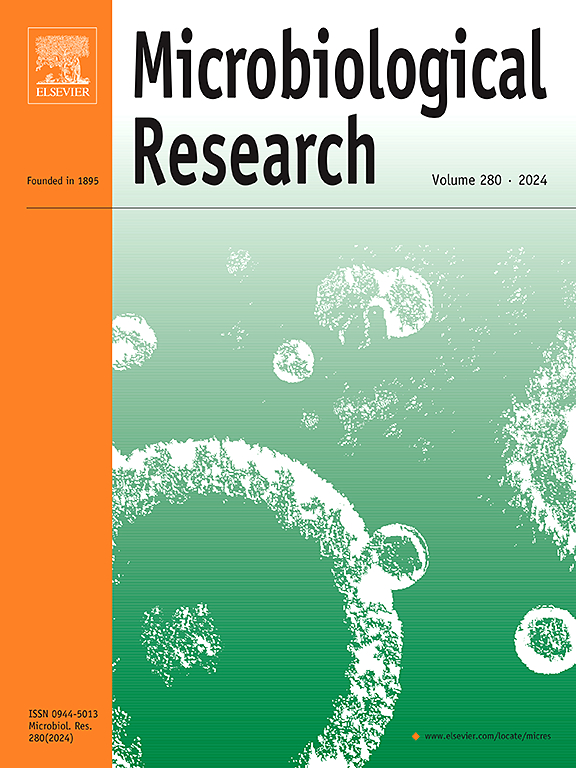Characterization and therapeutic efficacy of phage p9676 against epidemic ST11-KL64 Klebsiella pneumoniae: Insights from genomic analysis and in vivo studies
IF 6.9
1区 生物学
Q1 MICROBIOLOGY
引用次数: 0
Abstract
Introduction
Klebsiella pneumoniae presents a formidable challenge in clinical settings due to its increasing resistance to last-line antibiotics like carbapenem, tigecycline, and colistin, raising global concerns. An emerging alternative strategy involves harnessing bacteriophages to combat infections caused by multidrug-resistant bacteria.
Methods and results
In this study, we isolated the bacteriophage p9676 from hospital sewage and demonstrated its ability to lyse K. pneumoniae strains with ST11-KL64 capsular type. Transmission electron microscopy and genomic analysis identified p9676 as a member of the Caudoviricetes class, Autographiviridae family, with a double-stranded DNA genome of 41,095 base pairs and a GC content of 52 %. The genome contains 53 coding DNA sequences (CDSs) and lacks tRNA, virulence, or antibiotic resistance genes. Notably, p9676 exhibited a short latent period of only 5 min and an optimal multiplicity of infection (MOI) of 0.0001. In vivo studies further demonstrated that p9676 effectively treated ST11-KL64 K. pneumoniae-infected mice, significantly reducing the blood bacterial load compared to untreated controls. Genomic analysis also revealed that resistance to p9676 was associated with a disruption in the capsule synthesis gene wcaJ caused by the insertion sequence ISKpn26.
Conclusion
Our findings underscore the effectiveness of phage p9676 therapy in combating epidemic ST11-KL64 K. pneumoniae infections, highlighting its potential as a promising treatment option.
噬菌体p9676对ST11-KL64肺炎克雷伯菌的特性和治疗效果:来自基因组分析和体内研究的见解
肺炎克雷伯菌对碳青霉烯、替加环素和粘菌素等最后一线抗生素的耐药性日益增强,在临床环境中构成了巨大挑战,引起了全球关注。一种新兴的替代策略涉及利用噬菌体来对抗由多重耐药细菌引起的感染。方法和结果从医院污水中分离出噬菌体p9676,证实其具有裂解ST11-KL64荚膜型肺炎克雷伯菌的能力。透射电镜和基因组学分析鉴定p9676为Autographiviridae科Caudoviricetes类成员,双链DNA基因组41,095个碱基对,GC含量为52% %。基因组包含53个编码DNA序列(CDSs),缺乏tRNA、毒力或抗生素抗性基因。值得注意的是,p9676的潜伏期较短,仅为5 min,最佳感染多重性(MOI)为0.0001。体内研究进一步证明,p9676能有效治疗ST11-KL64感染肺炎克雷伯菌的小鼠,与未治疗的对照组相比,显著降低血液细菌负荷。基因组分析还显示,对p9676的抗性与插入序列ISKpn26引起的荚膜合成基因wcaJ的破坏有关。结论噬菌体p9676治疗ST11-KL64肺炎克雷伯菌感染的有效性,是一种有前景的治疗方案。
本文章由计算机程序翻译,如有差异,请以英文原文为准。
求助全文
约1分钟内获得全文
求助全文
来源期刊

Microbiological research
生物-微生物学
CiteScore
10.90
自引率
6.00%
发文量
249
审稿时长
29 days
期刊介绍:
Microbiological Research is devoted to publishing reports on prokaryotic and eukaryotic microorganisms such as yeasts, fungi, bacteria, archaea, and protozoa. Research on interactions between pathogenic microorganisms and their environment or hosts are also covered.
 求助内容:
求助内容: 应助结果提醒方式:
应助结果提醒方式:


